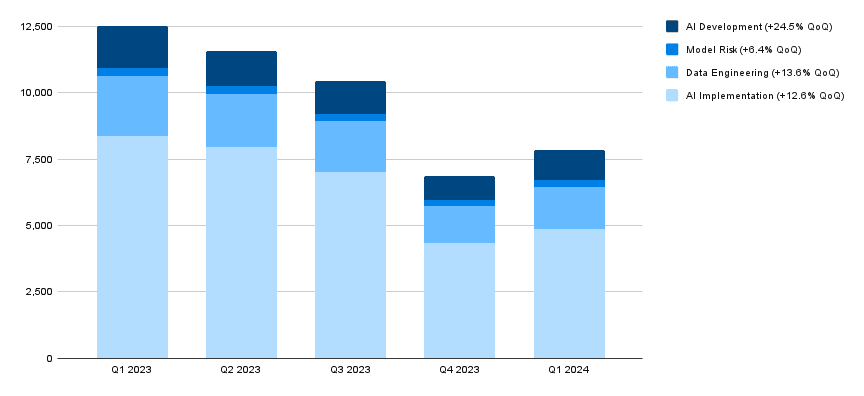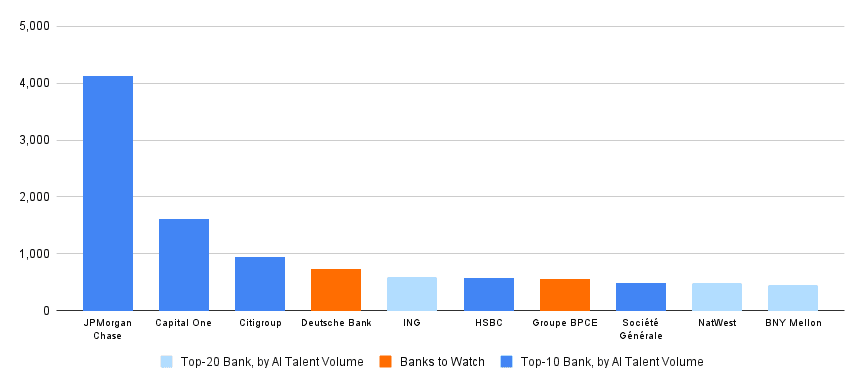
DATA-DRIVEN INSIGHTS AND NEWS
ON HOW BANKS ARE ADOPTING AI
Breaking: Latest AI Talent Data
13 June 2024
TODAYS BRIEF
Programming note: The Evident AI Symposium next Wednesday will bring together senior AI leaders from across the banking sector. Come join us virtually on June 19.
Now, first in The Brief, today we’re releasing our latest data on AI hiring. One upshot: The talent bubble hasn’t burst, but over the past year it has followed the dip in overall hiring. Another: AI hiring is now rapidly picking up again, and not surprisingly U.S. banks are leading the way. More details in the monthly Evident Dispatch exclusively for members. Also, financial regulators are turning cool on AI, HSBC is rolling out Q Assist and JPMC gets a new CTO. The Brief is 2132 words, a 7 minute read.
If this newsletter was forwarded to you, subscribe here. We want to hear from you: [email protected].
LATEST FROM THE EVIDENT AI INDEX
AI TALENT BUBBLE FIZZLES, DOESN’T POP
AI-focused hiring in banks was 37% lower in the first quarter of 2024, compared to the same period a year earlier, according to Evident’s Dispatch: Talent Development out today.
The bigger picture: Overall hiring across the banking sector is also down, following cost-cutting and rationalization the past year, but the proportion of AI hires to total banking hires remained stable, at 11% of all job listings.
Signs of life: The pace of recruitment is heating up again following a strong quarter for the industry. AI job posts increased 14% from Q4 2023 to Q1 2024, including a 25% increase in AI Development roles. American banks are adding AI Development job listings around six times as fast as their European rivals.
AI-Specific Job Posts, by Capability Area
Q1 2023 – Q1 2024

The leaders: JPMorgan Chase, Capital One, and Citigroup dominate the 2024 AI hiring landscape, accounting for 38% of all AI job posts and more than half (53%) of generative AI roles advertised in the last six months.
Top 10 Banks: Total AI Job Posts
October 2023 - April 2024

Banks to watch: Six of the top 10 banks filling AI roles are from Europe. Of these, Deutsche Bank and Groupe BPCE stand out. They have the highest ratio of open AI job posts to current AI talent—a good proxy for banks looking to accelerate their AI capabilities in the near-term.
So what? Despite the year-on-year decline, the fact that AI hiring has stayed stable as a proportion of all hiring—even as that talent gets more expensive—indicates that it remains a strategic priority for the banks. The recent acceleration in hiring for AI Development roles in the U.S. could see the banks there widen their leads over peers in other regions.
Learn more about the latest hiring trends in Evident’s latest Dispatch. The full report is for members. Non-members can download an excerpt of the report, including key findings. To learn more about membership, please contact us.
WHAT’S ON AT EVIDENT
EVIDENT AI SYMPOSIUM

Come join us virtually at the Evident AI Symposium, where we are bringing the most senior AI leaders from across the banking sector together to drive forward a global conversation around the realities of AI adoption.
We are zeroing in on the theme of Accelerating Outcomes: How are banks delivering value from AI now?
Don’t miss our panel discussions on: Which technologies do leading investors and innovators think will shape the future? Will quantum computing alter the foundations on which banking is built? What leading use cases are creating value?
Speakers include: David Schwimmer, CEO, LSEG; Clare Barclay, CEO, Microsoft U.K.; Jeremy O’Brien, Co-founder & CEO, PsiQuantum; Manuela Veloso, Head of AI Research, JPMorgan Chase; and Dan Jermyn, Chief Decision Scientist, Commonwealth Bank of Australia.
TOP OF THE NEWS
AI POLITICAL HEADWINDS
As banks integrate AI into their business practices, financial regulators are getting volubly nervous. And it’s no coincidence that this is happening as the politics around AI are turning sour, especially in America.
The U.S. Treasury Secretary Janet Yellen struck a cooler note at a conference on financial stability last week, warning that the “complexity and opacity of AI” and banks’ reliance on the “same data and models” is a recipe for trouble. Her colleague Michael Hsu, the comptroller of the currency, said at the same event that a “hyper-competitive race to grow revenues and market share” leads to “risks going undetected or unaddressed until there is an eventual reckoning.
“Before opening a gate and pursuing the next phase of development, banks should ensure that proper controls are in place and accountability is clearly established,” he added. That echoes a recent warning from the Bank of England’s Financial Committee member, Jonathan Hall, who said that unleashing AI on the trading floor makes us vulnerable to a shock.
On both sides of the Atlantic, policymakers have for the better part of the last year talked about AI. The Biden Administration’s executive order last fall directed, among other things, sectoral regulators to monitor AI developments closely in their industries.
But the political context has changed. The EU’s far-reaching AI Act goes into force this month, bringing a familiarly heavier European regulatory hand to bear. And after a brief love affair between Washington and the AI world last year, when Sam Altman was feted on Capitol Hill, the two are spoiling for the fight over AI—from its impact on national security and privacy to the purported threat of a further concentration of economic power in a few tech hands. Last week, America’s antitrust cops decided to move forward with their investigations of Nvidia, Microsoft and OpenAI.
The financial industry likely won’t be spared the closer scrutiny from regulators—both the sector-specific agencies that oversee finance as well as whatever broader “AI safety” government bodies are created. “Every agency should use the laws on the books that are very significant,” Rohit Chopra, the director of the Consumer Financial Protection Board in Washington, told us recently. “It’s all hands on deck.”
The feds are even crowdsourcing, with The Treasury asking for information on the “uses, opportunities and risks” of AI in financial services.
EVIDENT TRIVIA
REMEMBER THAT PIN
Who invented the ATM?
Last time we asked “Which recent blockbuster features Jennifer Lopez as a Data Analyst?” No, the answer wasn’t Maid in Manhattan. It’s Atlas, where she turns to AI as her only hope to save humanity.
Email us your answer to this week’s question (no Googling please): [email protected]. The winner gets to run the next trivia round.
EVIDENT SPEED READS (AND A LISTEN)
SIX THINGS THAT CAUGHT OUR ATTENTION
Rabobank is investing in Hawk, an AI start-up that uses explainable AI to tackle fraud and money laundering. The agri-banking cooperative had been relatively quiet on investments, placing 41st of 50 for AI ventures in the Evident AI Index last year.
Mistral, the French generative AI startup, raised €600 million at a valuation of €5.8 billion, a little over a year since its founding. BNP Paribas invested for the second time, alongside Lightspeed, Andreessen Horowitz, Bpifrance and others.
NatWest announced that their customer chatbot, Cora, is getting a generative AI upgrade. The new Cora+ comes off their partnership with IBM and will be able to assist on a broader range of topics, draw information from a wider range of sources and be more proactive and natural in how it interacts with customers.
Santander suffered a data breach that may have affected as many as 30 million customers. Hackers breached a bank database hosted by a third party. This hack wasn’t related to AI, but as banks implement AI across their systems and bring in outside vendors, there will be many more doors for hackers to try to break through.
Alibaba says 90,000 companies are using their Qwen open-source models following an update last week. The new model Qwen2 scores better than Meta’s Llama 3 and Mistral’s Mixtral on industry-standard benchmarks. Taken with other recent releases, Chinese open models might be pulling ahead of Western counterparts.
Google Deepmind CEO Demis Hassabis, in an interview with Matt Clifford last week, offered up his view on the future of LLMs and ongoing work on AI drug discovery.
NOTABLY QUOTABLE
"Trust not only sits at the heart of banking, it is likely the limiting factor to AI adoption and use more generally."
— Michael Hsu, Acting U.S. Comptroller of the Currency, speaking at the 2024 Conference on Artificial Intelligence and Financial Stability
TALENT CORNER
JPMC’S NEW CTO
JPMorgan Chase is bringing new faces into its tech leadership team following the retirement of group CTO and CIO of Data and Analytics A.J. Lang. The bank split his job: Sri Shivananda joins from PayPal as the new CTO and Manoj Sindhwani from Amazon as CIO of Data and Analytics, the division that oversees the bank’s AI initiatives. Both report to group CIO Lori Beer.
HSBC named Sophie Taylor Global Head of Operations & Strategic Delivery for Technology. The bank has been attracting tech executives from big U.S. players, including Stuart Riley coming in as CIO from Citi.
Matthew Steele, Standard Chartered’s Chief Information & Security Officer (CISO) for the past five years, left to join Vanguard.
USE CASE CORNER
VENDORS HELPING BANKS CRACK GEN AI
Banks are head down on testing generative AI use cases, and in this week’s Use Case Corner, we identify three of the most interesting ones in the past two weeks.
#1 Decision Support
Use Case: Quantexa “Q Assist”
Vendor: Quantexa
Bank: HSBC
How it works: With Q Assist, Quantexa is bolting on a generative AI capability to its Decision Intelligence Platform, which lets users look across their company databases to serve up data from a wider range of sources – and take faster, more accurate decisions.
Who is this for? David Rice, the chief operating officer of HSBC’s commercial banking division, said that for staff who work on complex sales strategies or anti-money laundering, Q Assist has “the potential to enhance efficiency and accuracy.”
Potential ROI → efficiency gains, accuracy, cost savings (~£17 million saved annually)
Reported ROI → n/a
#2 Fraud Detection
Use Case: Generative AI Fraud Detection
Vendor: Nvidia
Bank: bunq
Context: bunq, a European neobank with over €8 billion in deposits, is using Nvidia’s generative AI computing services to train its fraud detection model faster and be able to use a larger dataset to do that with.
How it works: By tapping into Nvidia’s computing power, bunq can automate and streamline the development of fraud detection AI.
Potential ROI → faster time to market (driven by increase in model training speed by 100x, using Nvidia)
Reported ROI → n/a
#3 Asset Management Support
Use Case: Decision Support
Bank: JPMC
Vendor: n/a
Context: JPMorgan Chase is working on a tool that puts generative AI into the hands of portfolio managers—a sign that the technology is moving out of the back office to consumers (also see The Brief: JPMorgan sends AI to meet the client).
How it works: Moneyball, still a pilot project, is intended to help portfolio managers better run their investments.
Potential ROI → improved fund performance
Reported ROI → n/a
CODA
SINGAPORE’S BID FOR AI HUBDOM
The focus of this Brief is the war for talent, and that can be a very local affair. Cities are competing to become the next AI hub. New York and Paris (aka “the home of Mistral”) are feeling good. London? Well, it risks losing the edge to Paris. The government’s clampdown on skilled immigrants and a hard stop on students allowed in from abroad is putting the squeeze on talent. Proposed tax changes will spook private equity. All that’s in contrast to America’s entrepreneur friendly environment and Emmanuel Macron’s “open for business” push in France.
Out in Asia, Singapore wants to borrow from the Macron playbook but has some significant challenges to overcome. The main one is talent. Financial firms are struggling to attract people into senior AI roles, according to a recent survey by Oliver Wyman and the Monetary Authority of Singapore (MAS).
Banks aren’t able to compete with tech companies, Laurence Liew, Director of AI innovation at AI Singapore, told us this week. “Local banks here still do not necessarily appreciate the value of AI/ML technical expertise not from the traditional STEM background. These multi-discipline engineers (ex engineers, accountants or lawyers now trained as AI Engineers) offer something different, that most large organizations including banks may not know how to value and appreciate, so they are probably not offering a salary that is competitive,” he said.
The government takes a hands-on approach here as with most things in Singapore. Its interest is obvious: Singapore is a city-state whose economy depends hugely on trade and finance.
MAS, the financial regulator in the country, has worked on AI and finance before it was fashionable, pioneering a collaborative framework. With a new visa scheme to draw in foreign AI engineers and a national AI Apprenticeship scheme which has taken 400 people working in industry, including banking, and upskilled them to take senior roles in product or AI transformation, Liew said.
MAS, the financial regulator in the country, has worked on AI and finance before it was fashionable, pioneering a collaborative framework. The government has also pushed a new visa scheme to draw in foreign AI talent, as well as investing in a national AI Apprenticeship scheme which has upskilled 400 professionals for senior AI roles, said Liew.
Our data shows some forward progress for Singapore. The headcount of AI developers (think data scientists and AI researchers) at Evident Index banks in the country grew 9% from September to March, beating out other hubs like London, New York and Paris which averaged 6%.
COMING UP
Thurs 13 June
Economist Fireside: The Transformation Agenda, New York
Fri 14th June
RAAIS AI Summit, London
Mon 17 June
Tues 18 June
Weds 19 June
Evident AI London Symposium, London (Livestream available)
Weds 19 June - Thurs 20 June
Open Source GenAI & ML Summit, Paris
Weds 19 - Thurs 20 June
Banking Transformation Summit, London
Thurs 20 June
Citi Digital Money Symposium, London
Tues 25 - Weds 26 June
Bloomberg Invest, New York
You know an event that you think should be featured? Let us know at [email protected].
THE BRIEF TEAM
- Alexandra Mousavizadeh|Co-founder & CEO|[email protected]
- Annabel Ayles|Co-founder & co-CEO|[email protected]
- Colin Gilbert|VP, Intelligence|[email protected]
- Andrew Haynes|VP, Innovation|[email protected]
- Alex Inch|Data Scientist|[email protected]
- Matthew Kaminski|Senior Advisor|[email protected]
- Sam Meeson|AI Research Analyst|[email protected]